Chapter 2-Negotiation Strategies谈判策略
国际商务谈判 Chapter 2
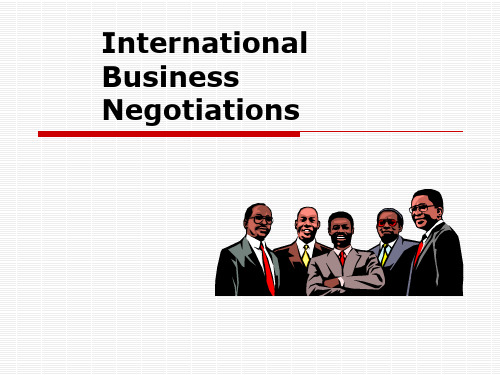
Chapter 2
Preparation for Negotiation
Lubrication
Preparation Every negotiation requires preparation. The preparation work functions, in a sense, as lubrication on either regular or an ad hoc basis.
1. The desirable target
is what negotiators wish to attain but in reality rarely reach. It serves two purposes in negotiations: A. setting a potential goal for negotiators to strive for; B. leaving room for bargaining in negotiations.
1. lack of sensitivity to differences in culture, consumer tastes, and market demands. 2. limited appreciation for the different environment abroad. Due to pressure to satisfy short-term financial goal, they are unwilling to spend money to find out about the differences.
3. The bottom target
谈判目标的确定
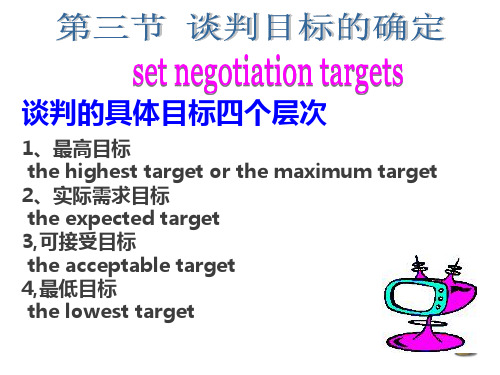
延长有效期的费用,第一个月约增加0.5%, 以后每一个月增加1%。如果超过3个月, 应重新报价。 此谈判的最长宽限期为两个月。
四,谈判班子的组成和分工
谈判时谈判主体间一系列的行为过程,谈判行为人的素质和能 力直接决定着谈判的成败得失。因此,在谈判方案中,对谈判班 子的组成和谈判人员的分工做出恰当的安排是十分重要的。 A公司的谈判人员安排 谈判负责人——L先生, 出口销售部门经理 主谈人——S先生,系统工程师 法律顾问——R先生 谈判人员分工: L先生:负责联系出口信贷担保机构,并负责从出口信贷担保经历 手中取得必要的文件(银行担保书) S先生:负责所有工程和生产方面的谈判,还负责向生产经历索取 各种有关的数据和资料 R先生:负责谈判中的一切法律事宜。
谈判情景1
您是想盘下这家店喽?
刘吉先生拥有一家经营比萨饼的快餐外卖店,去年营业额193 750磅, 税后利润36 750磅。这家店已经开业数年,位置极佳,对面是一家生意 兴隆的大商场,离得很近的同业是家“麦当劳”,距离在800米以外, 位于商场的另一头
刘吉打算趁着生意还算红火的时候及早把他盘出去,广告上要价 175 000磅,计:存货值5 000磅,厨房设备估计25 000磅,(购买的时 候花了35000镑),餐厅设备在3年前新修时花费19 000镑,其余部分为 店堂的不动产和商业信誉无形资产的估价。
A出口公司向国外客户推销产品的发盘得到回音,一场涉外贸易 谈判即将开始。A出口公司在派出谈判班子之前,制定了一个谈判 方案,这一方案的内容及制定依据如下:
一,谈判目标
贸易谈判的目标,一般是通过销售额的预期利润和价格标准来 体现的,当然还要考虑交易过程中的其他各种条件和风险因素。
【论文】商务英语谈判中的语言策略

AbstractAs globalization of world economy gains momentum, business negotiations have become more and more important nowadays. And in business negotiation process, language strategies play very important role in determining the outcome of the negotiation.Language users use different linguistic forms strategically to achieve different communicative intentions. Negotiators use pragmatic strategies to achieve their communicative intentions. While many scholars abroad have made a study of the strategies in business negotiation from a managerial view, which seems to be lacking in language data as evidence, most of the Chinese scholars have paid more attention to the pragmatic strategies such as strategies of politeness, humor, and euphemism applied in international business negotiations from different perspectives. Therefore, application of the pragmatic strategies can only be described as means of getting as much profit as possible under a competitive win-win negotiation situation.This paper is composed of four chapters. In the first chapter, I make a brief introduction to the negotiation and the business negotiation tactics. The second chapter is the most important chapter in the whole paper which is called verbal strategies. It explains language tactics from three periods, the beginning period, the negotiation period and the ending period. To aim at different period’s functions in negotiation, I will introduce different language tactics. Besides verbal strategies, non-verbal strategies also play a crucial role in negotiation. The third chapter, I will introduce the non-verbal strategies from body language, paralanguage, silence and etc. The last chapter is the conclusion part. I made an analysis in selecting a language during the negotiation.Not all the verbal pragmatic strategies can be applied in a business negotiation under a win-win situation. Some verbal pragmatic strategies such as politeness, humorand euphemism can be applied successfully and effectively under win-win negotiation situations。
商务英语综合教程IV(第三版)Unit2
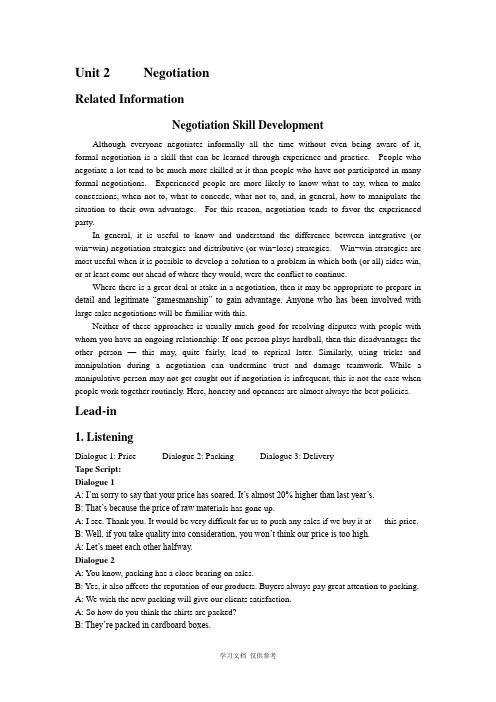
Unit 2 NegotiationRelated InformationNegotiation Skill DevelopmentAlthough everyone negotiates informally all the time without even being aware of it, formal negotiation is a skill that can be learned through experience and practice. People who negotiate a lot tend to be much more skilled at it than people who have not participated in many formal negotiations. Experienced people are more likely to know what to say, when to make concessions, when not to, what to concede, what not to, and, in general, how to manipulate the situation to their own advantage. For this reason, negotiation tends to favor the experienced party.In general, it is useful to know and understand the difference between integrative (or win-win) negotiation strategies and distributive (or win-lose) strategies. Win-win strategies are most useful when it is possible to develop a solution to a problem in which both (or all) sides win, or at least come out ahead of where they would, were the conflict to continue.Where there is a great deal at stake in a negotiation, then it may be appropriate to prepare in detail and legitimate “gamesmanship” to gain advantage. Anyone who has been involved with large sales negotiations will be familiar with this.Neither of these approaches is usually much good for resolving disputes with people with whom you have an ongoing relationship: If one person plays hardball, then this disadvantages the other person —this may, quite fairly, lead to reprisal later. Similarly, using tricks and manipulation during a negotiation can undermine trust and damage teamwork. While a manipulative person may not get caught out if negotiation is infrequent, this is not the case when people work together routinely. Here, honesty and openness are almost always the best policies.Lead-in1. ListeningDialogue 1: Price Dialogue 2: Packing Dialogue 3: DeliveryTape Script:Dialogue 1A: I’m sorry to say that your price has soared. It’s almost 20% higher than last year’s.B: That’s because the price of raw mater ials has gone up.A: I see. Thank you. It would be very difficult for us to push any sales if we buy it at this price. B: Well, if you take quality into consideration, you won’t think our price is too high.A: Let’s meet each other halfway.Dialogue 2A: You know, packing has a close bearing on sales.B: Yes, it also affects the reputation of our products. Buyers always pay great attention to packing. A: We wish the new packing will give our clients satisfaction.A: So how do you think the shirts are packed?B: They’re packed in cardboard boxes.A: I’m afraid the cardboard boxes are not strong enough for ocean transportation.Dialogue 3A: When can you effect shipment? I’m terribly worried about late shipment.B: We can effect shipment in December or early next year at the latest.A: That’s fine. How do you like the goods dispatched, by railway or by sea?B: By sea, please. Because of the high cost of railway transportation, we prefer sea transportation. A: That’s what we think.2. Spot DictationPart 11. soared2. push any sales3.take4.into consideration5. halfway6. bearing7. reputation8.satisfaction9. packed 10. ocean 11. shipment 12. dispatchedPart 21. Counter offer2. negotiating3. unacceptable4. bargaining5. regret for being unable6. other opportunities to do businessText ALanguage Study1. advocacyn. active support; especially the act of pleading or arguing for something 支持,拥护,提倡◆Patience is essential in negotiation while advocacy of “quick success”is harmful. advocate n.辩护者; 律师; 拥护者; 倡导者advocator n. 拥护者, 鼓吹者, 提倡者2. A “successful” negotiation in the advocacy approach is when the negotiator is able to obtain all or most of the outcomes his party desires, but without driving the other party to permanently break off negotiations.when the negotiator...是表语从句; but without driving...是分词短语,做状语。
【培训课件】商务谈判讲义-NEGOTIATION_SKILLS(谈判思维和心理、谈判策略与技巧、谈判

2.1.3 职能
• 实现购销 • 获取信息 • 开拓发展
2.2商务谈判的程序与模式
• 2.2.1程序 • 准备阶段:选择对象、背景调查、组建班
子、制订计划、模拟谈判 • 谈判阶段:开局、磋商、协议 • 履约阶段
2.2.2商务谈判的模式
条款顺序
商务谈判模式矩阵
慢速 中速
快速
跳跃
跳跃 跳跃
跳跃
慢速 中速
地了解别人的用意,就拥有最好的机会。
—— 美国保德信人寿保险公司 总裁 Robert Beck
知识经济时代背景的基本特点
• 知识经济时代的基本特征:知识成为 首要生产要素的时代;经济发展迅速、 观念和生活方式变革日益剧烈的时代; 人类走向终极文明的时代;创新致胜 的时代;竞争合作共赢的时代。
新时期谈判的新特点
然而,也可能经过沟通后是另外的情况,恰恰有一 个孩子即想要皮做蛋糕,又想喝橙子汁。这时,如何 能创造价值就非常重要了。
结果,想要整个橙子的孩子提议可以将其他的问题
拿出来一块谈。他说:“如果把这个橙子全给我,你 上次欠我的棒棒糖就不用还了”。其实,他的牙齿被 蛀得一塌糊涂,父母上星期就不让他吃糖了。
另一个孩子想了一想,很快就答应了。他刚刚从父
2.4 商务谈判的理论与原则
• 谈判的“需要理论” 五种需要: 生理、安全、爱与归属、尊重、自我实现三个层次: 国家间、组织间、个人间 六种适用方法: 谈判者为对方的需要出发 谈判者使对方从其自身需要着想 谈判者同时为对方和自己的需要着想 谈判者违背自己的需要 谈判者不顾对方的需要 谈判者同时损害对方和自己的需要
谈判地点
• 谈判开展的地点,谈判地点的选择是比较讲策略的。主 要有:
• 1、主座谈判 • 2、客座谈判 • 3 、主客座轮流谈判 • 4、主客场外的其他地点谈判
国际商务谈判 chapter 2
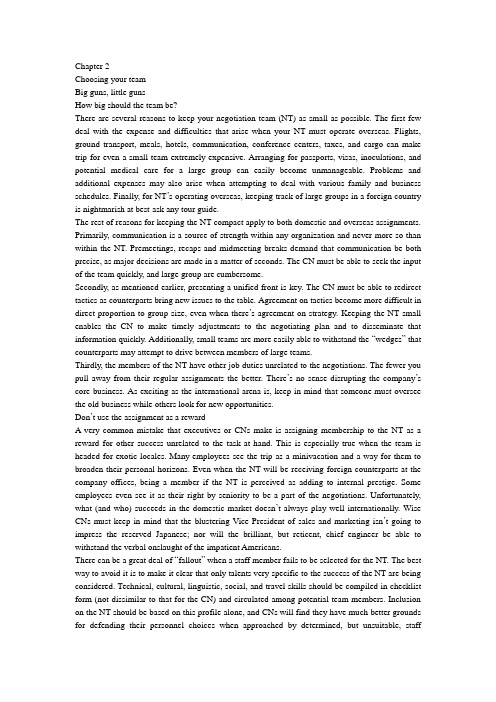
Chapter 2Choosing your teamBig guns, little gunsHow big should the team be?There are several reasons to keep your negotiation team (NT) as small as possible. The first few deal with the expense and difficulties that arise when your NT must operate overseas. Flights, ground transport, meals, hotels, communication, conference centers, taxes, and cargo can make trip for even a small team extremely expensive. Arranging for passports, visas, inoculations, and potential medical care for a large group can easily become unmanageable. Problems and additional expenses may also arise when attempting to deal with various family and business schedules. Finally, for NT’s operating overseas, keeping track of large groups in a foreign country is nightmarish at best-ask any tour guide.The rest of reasons for keeping the NT compact apply to both domestic and overseas assignments. Primarily, communication is a source of strength within any organization and never more so than within the NT. Premeetings, recaps and midmeeting breaks demand that communication be both precise, as major decisions are made in a matter of seconds. The CN must be able to seek the input of the team quickly, and large group are cumbersome.Secondly, as mentioned earlier, presenting a unified front is key. The CN must be able to redirect tactics as counterparts bring new issues to the table. Agreement on tactics become more difficult in direct proportion to group size, even when there’s agreement on strategy. Keeping the NT small enables the CN to make timely adjustments to the negotiating plan and to disseminate that information quickly. Additionally, small teams are more easily able to withstand the “wedges” that counterparts may attempt to drive between members of large teams.Thirdly, the members of the NT have other job duties unrelated to the negotiations. The fewer you pull away from their regular assignments the better. There’s no sense disrupting the company’s core business. As exciting as the international arena is, keep in mind that someone must oversee the old business while others look for new opportunities.Don’t use the assignment as a rewardA very common mistake that executives or CNs make is assigning membership to the NT as a reward for other success unrelated to the task at hand. This is especially true when the team is headed for exotic locales. Many employees see the trip as a minivacation and a way for them to broaden their personal horizons. Even when the NT will be receiving foreign counterparts at the company offices, being a member if the NT is perceived as adding to internal prestige. Some employees even see it as their right by seniority to be a part of the negotiations. Unfortunately, what (and who) succeeds in the domestic market doesn’t always play well internationally. Wise CNs must keep in mind that the blustering Vice President of sales and marketing isn’t going to impress the reserved Japanese; nor will the brilliant, but reticent, chief engineer be able to withstand the verbal onslaught of the impatient Americans.There can be a great deal of “fallout” when a staff member fails to be selected for the NT. The best way to avoid it is to make it clear that only talents very specific to the success of the NT are being considered. Technical, cultural, linguistic, social, and travel skills should be compiled in checklist form (not dissimilar to that for the CN) and circulated among potential team members. Inclusion on the NT should be based on this profile alone, and CNs will find they have much better grounds for defending their personnel choices when approached by determined, but unsuitable, staffmembers. This is especially true when other executives and managers assume they’re going to be part of the NT. As a way of preserving morale among those left off of the NT roster, some CNs make the deferrees part of the prenegotiation strategy planning process.A balance of skills and strengthsIt’s unlikely that any single team member will embody all of the talents necessary to achieve the company’s strategy. The CN must choose a cross-section of technical skills and personal attributes that will create a compact and efficient team. One team member’s weakness must be offset by another’s strength. Technical prowess must be a accompanied by the ability to communicate and apply that prowess. Putting a team together is similar to assembling a jigsaw puzzle: there’s no success unless all of the pieces fit.A common practice among experienced travelers when packing for trips is to never put anything in the suitcase that has “only one use”; the same applies to choosing NT members. A specialist candidate is eschewed in favor of the generalist unless the technical expertise is absolutely crucial to the effort. If the CN must include these “one trick ponies,” every attempt should be made to make them a part of the wider strategy and tactics discussions. If that’s unsuccessful, these specialist members should be cautioned to advise in private during negotiations and to avoid direct involvement.Painting the “big picture”Although many technical types will disagree, it’s much easier to impart technical knowledge to a good communicator than it is to do the reverse. Members of the NT must be chosen for their ability to effectively execute the company’s strategy and to quickly respond to the tactics of counterparts. This is accomplished only through good communications skills. Scientific and financial technical skills will take a back seat, especially during initial negotiations, as the “big picture” is discussed. Details will be left until much later in the process. Many business cultures prefer to have the details tended to after the contract is signed.Bringing massive technical data to the negotiating table may only slow down the deal-making process.NOTE: Much “expertise can be carried in file or laptop form, in case it should be needed during discussions.Tasks Both Large and smallMajor decisions are made every day during negotiations, but not all of the work is momentous. Some companies and consultant CNs make the mistake of including only “big guns” on the team. This causes problems, as no one relishes doing the necessary but tedious (and decidedly unglamorous ) work that keeps negotiations running smoothly—getting copies, typing policy changes, taking notes, arranging dinners, and so on .Including a few junior managers or administrators in the ranks of the NT for the sole purpose of controlling logistics is a wise move. This is particularly helpful if these members have experience working or traveling in the target market. Should the finances or domestic needs of the company preclude this option, these administrative duties should be assigned to specific members of the team, and it should be made clear that these duties are as important as any of the ,more “spot light”tasks. As is true in other areas of business, what happens behind the scenes determines success on the stage.Home Team Versus VisitorsThe respective sizes of the NT is usually determined by the group that’s visiting.This is particularly true if the visiting team is in the position of . “buying” from the home team or receiving group. The visiting group should forward a list of its members, stipulating the job title and responsibility of each. The receiving group should assemble their NT to correspond to the visiting team.It’s true that the receiving team has the psychological advantage of operating from their home turf, but they should resist the urge to overwhelm their visitors with an imposingly large NT. Since these resources can be called upon at any time, it’s best to see if they, re needed before arraying them. The ability to successfully exploit the discomfort of counterparts is very much related to one’s culture and requirements for a “success”. Some visitors may be in awe of your facilities and staff while others may consider it a visitors may be in awe of your is generally better when making initial contact.“Observer” TrainingCompanies that regularly pursue international trade and investment like to use negotiation as an ongoing training tool by purposely including less experienced members on the team. This allows them to gain experience that can be put to use in future international negotiations. It’s best to make it clear to these junior team members exactly why they’re being included in the NT so that they’re keen to gain as much experience as possible, get “bloodied” by their own mistakes, and learn from those of other team members .It’s also an ideal way for the company to see how their future CNs handle new and difficult situations. Many executives will attest to the fact that the “rising stars from the home office often become confused and ill-at-ease when put into the crucible of international negotiations and travel. Conversely, the mediocre manager may flourish in the new international environment.Those Who Can’“CUT IT”A common question in business when determining whether someone will be a success is , “Can they cut the muster?” (Sorry, folks, it isn’t mustard.) During the Middle Ages, the muster in question was the final pattern cut from cloth by journeymen to be used by the master tailor. Cut improperly, the pattern will never work, and valuable cloth will be ruined. International negotiations have a similar one-chance-is-all-you-get sense of finality. The NT acts as the journeymen and the CN is the master tailor preparing to stitch together a successful negotiation. Below are some types of people to avoid because they won’t be able “to cut it.”WHINERSEmployees who constantly complain, even under good conditions, are going to find travel and the stress of negotiations intolerable. These types love to bring up problems but never offer solutions. Every company has them, but successful negotiating teams don’t.CONNIVERSUnity is paramount for negotiations and people who like to work their own agenda or jockey for position will only undermine the team’s effort. These types are generally keen strategies and they may be useful in planning. However, under no circumstances should they ever take an active role in negotiations.HOTHOUSE FLOWERSMore competent than whiners, these “high maintenance”types can only excel under ideal circumstances. They never complain but are easily set back by the slightest deviation form the norm. Unfortunately, negotiations and overseas travel are rarely conducive to ideal anything. Sometimes, the NT must operate when materials and equipment are lost, or work in environmentsin which electricity is some trials reserved for special occasions. Technically astute or not, these “flowers” won’t travel well. If they must be used, do so only when negotiations are on home turf. An overseas team needs those that can adapt to any environment.BIGOTSNegotiations are a zero-sun game based on finding common ground amid very real and distinct differences. Adding racial, cultural, or class bigotry will only obscure an already complex state of affairs. Bigots (of any ilk) tend to communicate their prejudices more than they realize, and it’s not the kind of communication that leads to a successful deal.The frailRegardless of where the team originated, the world outside of the domestic market is filled with sights, sounds, smells, and tastes that pummel the visitor. Part of the success of the NT will be in its ability to assimilate as quickly as possible into the environment of their target market. The hygienic and culinary habits of counterparts and their culture may not meet the standards of the NT’s domestic scene. Members who can’t quickly and adequately adjust to new environments will only be a burden to the whole team, thus disrupting strategies and assignments. Like the CN, the team must be robust.Overseas? Domestic? One core team?Optimally, once a team is assembled, it should be used for both overseas and domestic negotiations related to international business. (Specialists may be added for individual negotiations.) This is especially true for smaller companies with limited resources. But large companies should not make the mistake of having two separate teams-one for overseas and one for domestic discussions-simply because they can afford the expense. Teams that have operated overseas will understand the stresses and strains being exerted on foreign teams when they come for business visits. This information, used sympathetically or otherwise, can be a key part of the overall strategy and daily tactics. Lastly, using the team for all negotiations will add to its ability to operate as a unit as team members become expert at all aspects of negotiating. They must be able to visit as well as host a negotiation and understand the responsibilities of being on either side of the table.。
Negotiationskills谈判技巧

• personal styles • 个人性格对谈判的影响
Hellreigel’s classification of interpersonal styles P267
• Self-denying • Self-protecting • Self-exposing • Self-bargaining • Self-actualizing
(4). Develop support arguments based on information, facts, logic, get useful information for negotiation. (获取信息)
Preparation (Planning stage)
• Before negotiating, take the time to plan carefully and thoughtfully. In the planning stage, create a set of clear objects to steer the process in the right direction and achieve the desired results. Thoughtful negotiators think about the ways in which the objectives can be achieved.
• What we prepare in the planning stage?
(1). Personal styles in negotiation
• Whenever people come together to negotiate, they bring their own personal styles to the situation. These personal styles affect the way they communicate and handle the conflict.
Negotiation skills - 谈判技巧
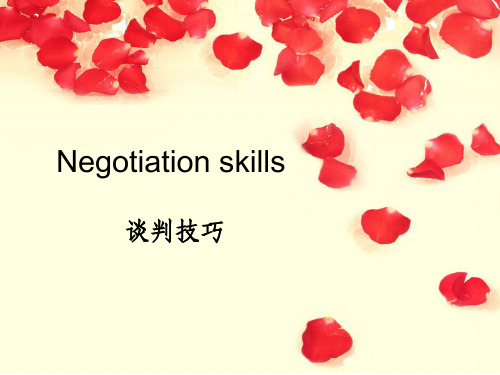
a
1
a
2
What is negotiation?
Negotiation is defined as the ability to collaborate with another party in order to conclude an agreement to the mutual benefit. Negotiation is also a process in which two or more people or organizations with common or conflicting interests work towards a way of resolving an issue or agrees on how they will cooperate.
desired results. Thoughtful
negotiators think about the
ways in which the objectives
can be achieved.
a
10
• What we prepare in the planning stage?
a
11
(1). Personal styles in negotiation
a
27
Self-actualizing
Self-actualizing people are ideal negotiators as they want to have information and feedback from the other person. This information and feedback is presented constructively to aid the negotiation process and to achieve goals and results that are effective without any conflict.
2.国际商务谈判 Chapter Two

I. The opening and its review
In this stage, N.ors get to know each other & identifying issue involved. After that, review followed. N.ors modify their N.ing plan → necessary to take account any factors appear in the opening of which they not previously aware. • N. is usually initiated by one party submitting a proposal to the other, suggesting joint action. If the idea appears to have merit, then both parties will likely further develop it. As the matter progresses, each party will present it’s own proposition to the other so that a basis for discussion can be established. This might take the form of both parties sitting down and tentatively expressing their viewpoints and their understanding of the possibilities inherent in a cooperative agreement. More commonly, a formal proposal is likely to be followed by face-toface discussions. •
实务:跨文化谈判策略(英文版)
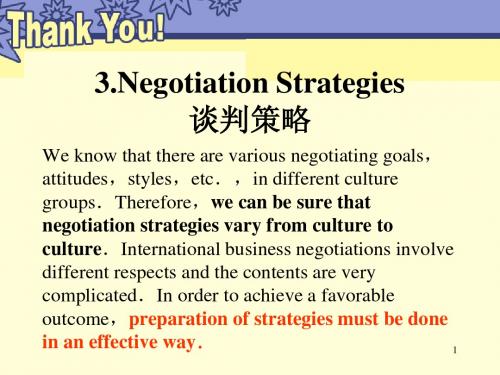
● Making a high offer at the beginning of negotiation. If you are an exporter, you should make a high offer at the beginning of the negotiation and try your best to achieve your best aim through negotiation. Even if the best aim could not be achieved, you could reduce your price step by step without taking any financial risks because your first quotation is high enough.Meanwhile,as reducing your prices step by step will make a good impression on the other party, he will be pleased to cooperate with you. 9
• Designing your own agenda most suitable to you and letting all the negotiator be very familiar with the plan. • Comparing your own agenda with your counterpart’s when you have got his agenda and considering how to adopt new strategies and tactics,which should be used with caution.
三家竞争性谈判流程
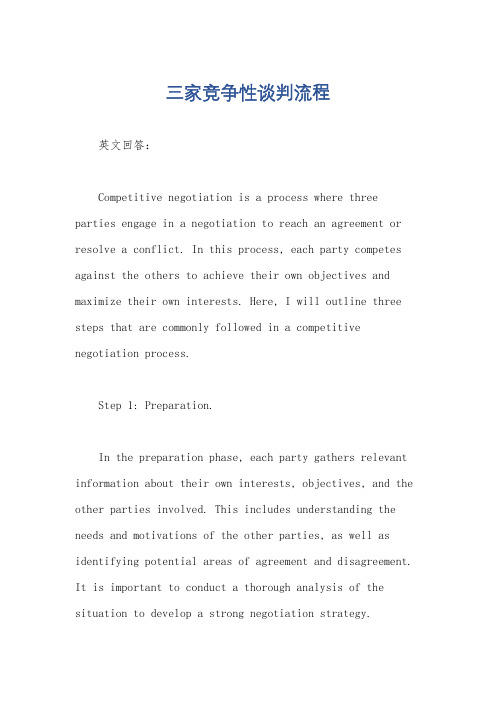
三家竞争性谈判流程英文回答:Competitive negotiation is a process where three parties engage in a negotiation to reach an agreement or resolve a conflict. In this process, each party competes against the others to achieve their own objectives and maximize their own interests. Here, I will outline three steps that are commonly followed in a competitive negotiation process.Step 1: Preparation.In the preparation phase, each party gathers relevant information about their own interests, objectives, and the other parties involved. This includes understanding the needs and motivations of the other parties, as well as identifying potential areas of agreement and disagreement. It is important to conduct a thorough analysis of the situation to develop a strong negotiation strategy.中文回答:竞争性谈判是三方参与的一种谈判过程,旨在达成协议或解决冲突。
在这个过程中,每个参与方都竞争对手以实现自己的目标和最大化自己的利益。
谈判计划的基本要求

谈判计划的基本要求Negotiation planning is a crucial aspect of any successful negotiation process. Before engaging in any negotiation, it is essential to establish a clear plan outlining the objectives, strategies, and tactics that will be used to achieve a favorable outcome. 谈判计划是任何成功谈判过程中至关重要的一个方面。
在参与任何谈判之前,建立一个明确的计划至关重要,其中要阐明实现有利结果所需使用的目标、策略和战术。
One of the basic requirements of a negotiation plan is the identification of the parties involved and their respective interests and priorities. It is crucial to understand the motivations and goals of all parties to effectively negotiate and find common ground for a mutually beneficial agreement. 谈判计划的一个基本要求是确定参与方以及他们各自的利益和优先事项。
了解所有各方的动机和目标是有效谈判并找到互利协议的共同基础至关重要。
Another essential element of a negotiation plan is the establishment of clear and realistic objectives. Setting specific, measurable, achievable, relevant, and time-bound (SMART) goals will help guide the negotiation process and ensure that progress is being madetowards a successful outcome. 谈判计划的另一个重要要素是建立明确且现实的目标。
谈判策略
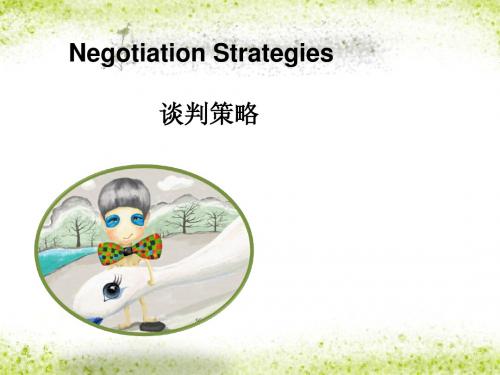
3.Negotiation Strategies 谈判策略
• 我们知道不同的文化群体有不同的谈判目 标,态度和风格等等。所以,我们可以断定 谈判策略因文化不同而有差异.国际商务谈 判涉及不同方面和内容,为了达到良好的 效果,必须通过有效途径做好谈判策略的准 备。
如果你是一个出口,记住永远不要在谈判之 初对价格做出妥协的事,否则你将失去其它 的优势,例如产品的质量,和其他条件的交易。
● 在开始谈判时拒绝出口商的报价
• 作为一个进口商,你应该在谈判开始的时 候拒绝出口商的价格以占据上风从而有助 于在其它问题上获得最高的让步,或测试对 方报价的真实性,或试探出口商愿意降低价 格的程度。无论如何,你会强迫你的对手 降低他给出的高报价。
3.1 Aims of Negotiation 谈判目标
• 确定谈判目标意味着谈判者应该根据自己 的实际情况确认他们所期望的结果,从而避 免被对手操纵。
• 在商务谈判之前,需要决定三个不同的目标:最 优目标、次优目标和可接受目标。最优目标是 最理想的目标,使你获得最大利益,帮助你达到 谈判前所期望的所有结果。如果你在世界市场 处于有利地位,作为谈判代表,你要抓住一切机 会从始至终坚决维护预期的目标来实现最优目 标。直到你发现很难达成最优目标,作为谈判代 表你最好做好的准备促成你的次优目标,这对双 方都是公平的,虽然它相对于最优目标为您提供 了较低的利益。当你发现你在世界市场没有优 势,或者你碰到一个熟练的谈判代表,或者你需 要出口、进口一些商品,你就得面对现实,接受 第三个目标,即可接受的目标
3.2 A Practical Negotiation Plan 实用谈判计划
• 在确定谈判目标后制定实用谈判计划非常 重要。在参与谈判时有一个实用有效的谈 判计划会是非常明智的。有效的计划对达 成谈判目标非常重要。如果谈判各方要达 成一个稳固的协议,具体事项需要在各方 来到谈判桌前就安排好。
Negotiation Strategies and Tactics (II)

Summarize progress and areas of agreement…
Practicing Handling Conflicts
We are your regular buyers, but the discount you offered to us is the same with all the other buyers including those new ones. I don’t think it’s fair for us and therefore we demand a 5% discount.
Francoise
Andrew from Okus starts to feel his position is under threat.
Sean
Karen is beginning to get frustrated with Sean and even sometimes with Andrew.
• New words here: • don’t get me wrong:别误会
• Handling Conflicts (version 2) • Andrew: So we’ll draw up a schedule of projects, which we both feel need to be carried out over the following year. These could be introducing new software, training, hardware upgrades… • Sean: Sorry to interrupt, Andrew, but I still need to know when your guys are doing support work and when they’re doing project work. • Andrew: That does need to be clarified. • Karen: What if we put something in the contract? • Sean: That’d be a start. It’s more the logging I worry about. You know if one of your guys has spent a couple of hours sorting out a problem with one of the PCs and then an hour back on our customer databases, won’t he just think: “Well, that’s three hours of project work”? • Andrew: I hope not, Sean. Our team will be working to your budget. • Sean: I know that, Andrew, but who’s going to supervise all this?
国际商务谈判中的策略_谈判技巧_
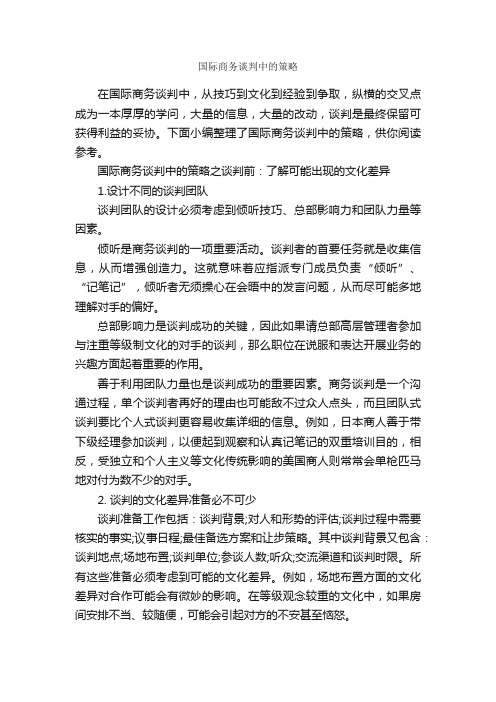
国际商务谈判中的策略在国际商务谈判中,从技巧到文化到经验到争取,纵横的交叉点成为一本厚厚的学问,大量的信息,大量的改动,谈判是最终保留可获得利益的妥协。
下面小编整理了国际商务谈判中的策略,供你阅读参考。
国际商务谈判中的策略之谈判前:了解可能出现的文化差异1.设计不同的谈判团队谈判团队的设计必须考虑到倾听技巧、总部影响力和团队力量等因素。
倾听是商务谈判的一项重要活动。
谈判者的首要任务就是收集信息,从而增强创造力。
这就意味着应指派专门成员负责“倾听”、“记笔记”,倾听者无须操心在会晤中的发言问题,从而尽可能多地理解对手的偏好。
总部影响力是谈判成功的关键,因此如果请总部高层管理者参加与注重等级制文化的对手的谈判,那么职位在说服和表达开展业务的兴趣方面起着重要的作用。
善于利用团队力量也是谈判成功的重要因素。
商务谈判是一个沟通过程,单个谈判者再好的理由也可能敌不过众人点头,而且团队式谈判要比个人式谈判更容易收集详细的信息。
例如,日本商人善于带下级经理参加谈判,以便起到观察和认真记笔记的双重培训目的,相反,受独立和个人主义等文化传统影响的美国商人则常常会单枪匹马地对付为数不少的对手。
2. 谈判的文化差异准备必不可少谈判准备工作包括:谈判背景;对人和形势的评估;谈判过程中需要核实的事实;议事日程;最佳备选方案和让步策略。
其中谈判背景又包含:谈判地点;场地布置;谈判单位;参谈人数;听众;交流渠道和谈判时限。
所有这些准备必须考虑到可能的文化差异。
例如,场地布置方面的文化差异对合作可能会有微妙的影响。
在等级观念较重的文化中,如果房间安排不当、较随便,可能会引起对方的不安甚至恼怒。
另外,谈判方式也因文化而异。
美国文化倾向于众人一起来“敲定一个协议”;而日本文化喜欢先与每个人单独谈,如果每个人都同意的话,再安排范围更广的会谈;俄罗斯人喜欢累计的方法,和一方先谈,达成一项协议,然后前面的两方再邀请第三方,如此进行下去。
谈判时限的控制也很重要。
谈判战略梳理

谈判战略梳理第二章对立型谈判的策略一、Fundamental Strategies(这里指对立型谈判中买方可以运用的四种战略)1. Push for settlement near opponent’s resistance point尽量作出一个接近于卖方的拒绝点2. Get the other party to change their resistance point说服另一方改变他们的拒绝点3. If settlement range is negative, either:如果存在一个消极谈判空间,买方可以有两种选择(消极谈判空间是指当卖方的拒绝点高于卖方的拒绝点时,买方就不可能接受卖方提出的最低价。
我们把这种情况称为消极的谈判空间)(1)Get the other side to change their resistance point(买方可以说服卖方降低拒绝点以创造积极的谈判空间。
积极的谈判空间是指的买卖双方拒绝点之间的交集部分)(2)Modify your own resistance point(买方可以改变自身的拒绝点以形成交叠)4. Convince the other party that the settlement is the best possible(使卖方相信这是所能取得的最好结果)二、The keys to implementing any of the four strategies are(对立型谈判各种战略下的两个重要任务,也就是说,无论采取何种战略,有所以对立型谈判情形中,有以下两个任务是很重要的:)1. Discovering the other party’s resistance point找出对方的拒绝点2.Influencing the other p arty’s resistance point影响对方的拒绝点三、Tactical Tasks of Negotiators对立型谈判的四大战术任务1.Assess outcome values and the costs of termination for the other party 评估另一方的目标、拒绝点和中止谈判的成本(可以有两种方法完成任务,即间接估计和直接估计)2.Manage the other party’s impressions管理另一方的印象(可以通过以下两种方式来实现)(1)Screen your behavior:掩盖谈判立场Say and do as little as possible就是尽可能少说话少做事(2)Direct action to alter impressions通过一些直接行为来改变印象Present facts that enhan ce one’s position 选择性表述一些事实以加强自己的立场3.Modify the other party’s perceptions改变自身的目标印象(1)Make outcomes appear less attractive降低成果的吸引力(2)Make the cost of obtaining goals appear higher提高成本(3)Make demands and positions appear more or less attractive to theother party – whichever suits your needs将自己的需求和立场对另一方变得更有吸引力或更不具有吸引力4.Manipulate the actual costs of delay or termination 控制因拖延或终止谈判而造成的实际损失,有三种方法如下:(1)Plan disruptive action 制造混乱Raise the costs of delay to the other party增加延迟给对方造成的损失(2)Form an alliance with outsiders 联合抵制Involve (or threaten to involve) other parties who can influence theoutcome in your favor涉及(或威胁涉及)其他可以影响对自己有利结果各方,就是说你寻找外围的帮助力量,这些力量能够影响谈判结果,使这个结果你自己有种(3)Schedule manipulations 控制谈判时间One party is usually more vulnerable to delaying than the other意思是如果延迟谈判,一方比起另一方而言,会更加脆弱。
商务谈判有哪些策略
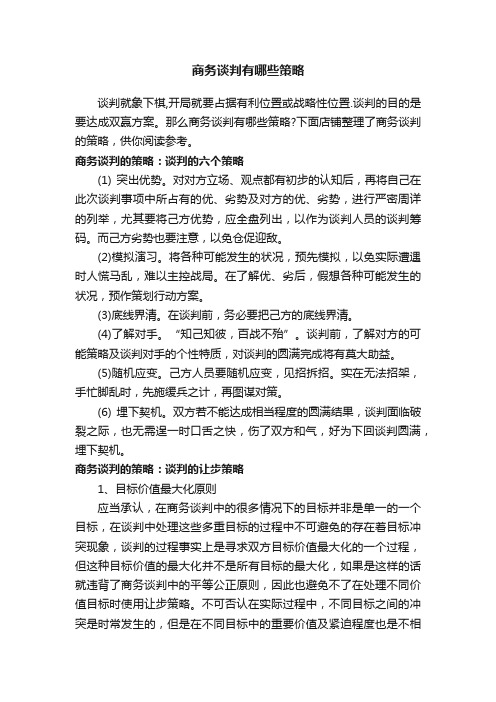
商务谈判有哪些策略谈判就象下棋,开局就要占据有利位置或战略性位置.谈判的目的是要达成双赢方案。
那么商务谈判有哪些策略?下面店铺整理了商务谈判的策略,供你阅读参考。
商务谈判的策略:谈判的六个策略(1) 突出优势。
对对方立场、观点都有初步的认知后,再将自己在此次谈判事项中所占有的优、劣势及对方的优、劣势,进行严密周详的列举,尤其要将己方优势,应全盘列出,以作为谈判人员的谈判筹码。
而己方劣势也要注意,以免仓促迎敌。
(2)模拟演习。
将各种可能发生的状况,预先模拟,以免实际遭遇时人慌马乱,难以主控战局。
在了解优、劣后,假想各种可能发生的状况,预作策划行动方案。
(3)底线界清。
在谈判前,务必要把己方的底线界清。
(4)了解对手。
“知己知彼,百战不殆”。
谈判前,了解对方的可能策略及谈判对手的个性特质,对谈判的圆满完成将有莫大助益。
(5)随机应变。
己方人员要随机应变,见招拆招。
实在无法招架,手忙脚乱时,先施缓兵之计,再图谋对策。
(6) 埋下契机。
双方若不能达成相当程度的圆满结果,谈判面临破裂之际,也无需逞一时口舌之快,伤了双方和气,好为下回谈判圆满,埋下契机。
商务谈判的策略:谈判的让步策略1、目标价值最大化原则应当承认,在商务谈判中的很多情况下的目标并非是单一的一个目标,在谈判中处理这些多重目标的过程中不可避免的存在着目标冲突现象,谈判的过程事实上是寻求双方目标价值最大化的一个过程,但这种目标价值的最大化并不是所有目标的最大化,如果是这样的话就违背了商务谈判中的平等公正原则,因此也避免不了在处理不同价值目标时使用让步策略。
不可否认在实际过程中,不同目标之间的冲突是时常发生的,但是在不同目标中的重要价值及紧迫程度也是不相同的,所以在处理这类矛盾是所要掌握的原则就需要在目标之间依照重要性和紧迫性建立优先顺序,优先解决重要及紧迫目标,在条件允许的前提下适当争取其他目标,其中的让步策略首要就是保护重要目标价值的最大化,如关键环节——价格、付款方式等。
- 1、下载文档前请自行甄别文档内容的完整性,平台不提供额外的编辑、内容补充、找答案等附加服务。
- 2、"仅部分预览"的文档,不可在线预览部分如存在完整性等问题,可反馈申请退款(可完整预览的文档不适用该条件!)。
- 3、如文档侵犯您的权益,请联系客服反馈,我们会尽快为您处理(人工客服工作时间:9:00-18:30)。
“It must seem like that to you, doesn’t it? ”
Refusing to strike back eventually bores your attacker. When there is no fuel for the fire, there is no fire.
Dealing with different types of difficult people
1) Dealing with the bully
(仗势欺人者,横行霸道者)
Bullies
use a variety of techniques, such as making take-it-or-leave-it offers, screaming, etc. A bully is anyone who tries to intimidate someone who is perceived as weaker.
c. The screamer is a bully. If the person is trying to bully you, read the six basic skills to treat a bully mentioned above. The worst thing you can do is to sink to the level of someone else’s negative behavior pattern. If you are not normally a screamer, don’t start just because the person sitting across you start yelling.
a. Prepare
Be sure that you know everything you need to know about your counterpart before you begin the negotiation.
b. Set limits
Be sure that you are very clear about the limits you set. Never accept from a bully a deal that you would not accept otherwise.
For example, if someone says
“You keep forgetting that price over and
over again. Have you lost your mind?”
How would you respond to such a criticism?
You say,
---Show them you understand by active listening and asking questions— especially open—ended ones like “why,” “how,”, “what,” “tell me about,” and “explain.” Above all, imagine yourself in their position. Figure out what’s really going on. Then search for a solution.
When it comes to labeling, there are a few rules to follow. a. First, let them know that what you have given up is costly to you. By doing so, you clarify that a concession was, in fact, made.
If your counterpart becomes emotional, trying to convince them tend to be fruitless.
Rather, listening respectfully and acknowledging the reasonableness of their points and feelings, without agreeing, will be far more productive.
c. Maintain emotional distance
Take a few minutes to cool down, when someone is Байду номын сангаасrying to bully you.
d. Listen
Work hard to listen to a bully and try to get the information you need from his remarks.
a. The screamer is truly angry, upset or scared. b. The screamer is a habitual screamer. They scream every now and then in negotiations, which is annoying, but harmless—if you know you are dealing with such a person, just don’t respond.
c. Third, don't give up on your original demands too hastily. Your concessions will be more powerful when your counterpart views your initial demands as serious and reasonable. Accordingly, spend time justifying your original offer and then use it as a reference point when labeling your concession.
b. Another way to deal with such persons is to take a break.
A situation is seldom so urgent that you can’t take a break and come back at a later time. Even a short break is helpful to clear the air after an outburst.
All these phrases are surprisingly calming.
It’s not that you are agreeing with the screamer, but you’re telling your counterpart that you want to understand what he or she is saying and feeling.
b. Second, emphasize the benefits to the other side. It is found that negotiators reciprocate concessions based on the benefits they receive, while tending to ignore how much others are sacrificing.
e. Communicate clearly
Let the other party know exactly what you want.
f. Close
Try to close the deal at every opportunity.
2) Dealing with the screamer
How to deal with a screamer?
a. When someone is yelling at you in negotiations, try one of these phrases:
--- I hear from your voice that you’re upset. --- Let me be sure that I understand you. --- Tell me more about that.
Why?
To avoid the strong obligation to do something in return. As a result, it is your responsibility to label your concessions and make them clear to the other party.
2. Strategies for making concessions
1) Label your concessions
In negotiation, don't assume that your actions will speak for themselves. Your counterparts will be motivated to ignore your concessions.
Types of Screamer The screamer is anyone who does a great deal of yelling or screaming. This personality type is a variation on the bully, but we deal with screamers separately because three distinct types of screamers exist.
Negotiation Strategies
Strategies for international business negotiations
